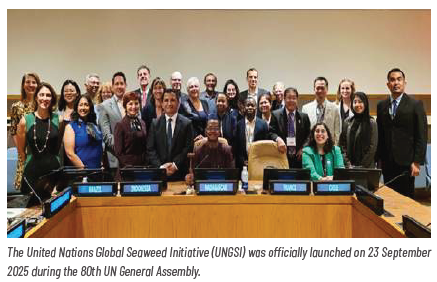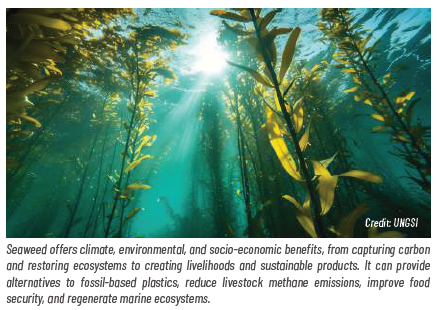FishBytes: A seaweed revolution begins: United Nations Global Seaweed Initiative officially launched

The global seaweed sector has tripled in size and doubled in value over the past two decades, reaching more than 35 million tonnes in 2022 and over USD 1.2 billion in exports in 2023. Yet despite this impressive growth, the sector remains under-supported, facing fragmented regulation as well as lacking the governance, standards, and coordination needed to fully realise its potential.
UNGSI aims to change that. It will serve as a global platform for cooperation, bringing together Member States, UN entities, research institutions, civil society, and industry stakeholders. It will strengthen policy leadership, foster scientific research and innovation, build technical capacity in producer countries, and raise awareness of seaweed’s role in achieving the Paris Agreement and the 2030 Agenda for Sustainable Development.
Chairing the launch, HE Paubert Tsimanaoraty Mahatante, Madagascar’s Minister of Fisheries and the Blue Economy, spoke about seaweed’s transformative potential. He described it as a resource that nourishes communities, restores ecosystems, and drives inclusive economic growth. He thanked the supporting founding partners — including UNCTAD, UNGC, UNIDO, FAO, IOC-UNESCO, and the Global Seaweed Coalition — for their commitment to advancing this shared vision.
Indonesia emphasised seaweed’s role as a catalyst for millions who depend on the sea, while Chile looked ahead to the 4th UN Ocean Conference in 2028, declaring that the journey had begun and that UNOC4 would be a milestone of achievements. Brazil, preparing to host COP30 next November, underscored the urgency of implementation, highlighting seaweed’s role in climate solutions and the livelihoods of two million Brazilian fishers — a microcosm of millions more around the world vulnerable to climate change.

The Initiative will also contribute to the sustainable management of seaweed species found in areas beyond national jurisdiction, under the framework of the soon-to-enter-into-force United Nations BBNJ Agreement. Its next major milestone will be COP30, where UNGSI will feature prominently as a key accelerator of the global climate agenda.
For more information, please contact:
























